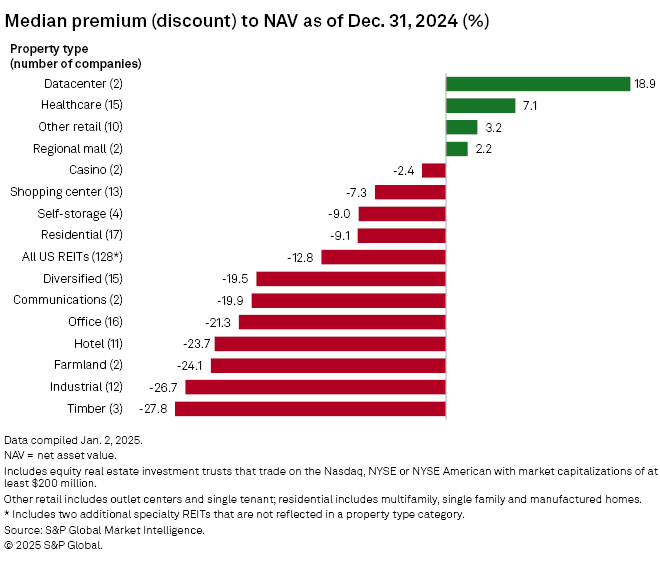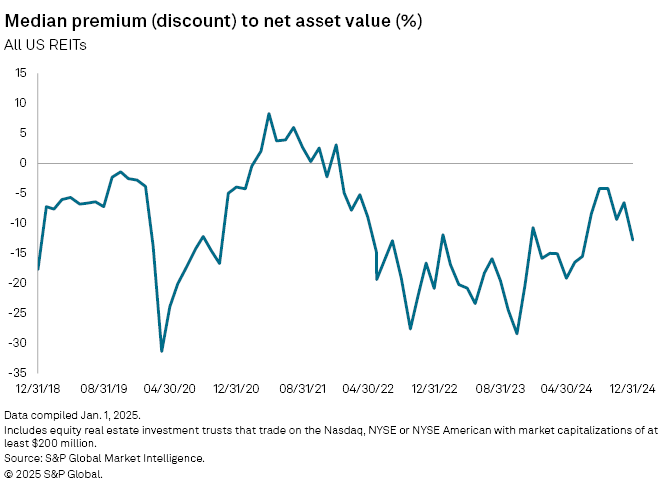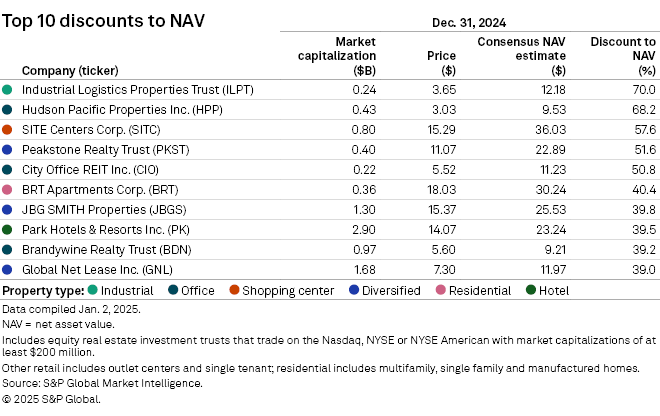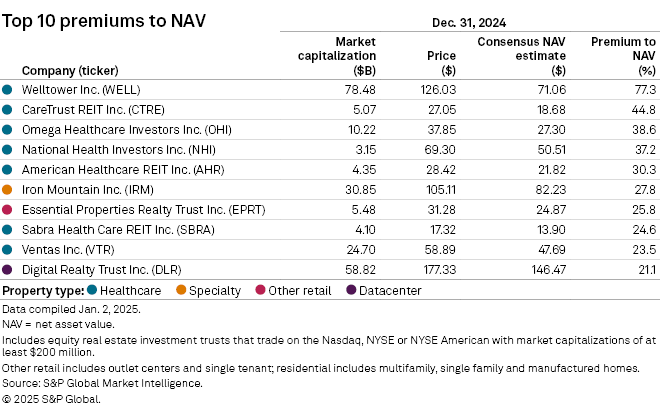
This Data Dispatch is updated monthly and was last published Dec. 3. The analysis includes equity real estate investment trusts that trade on the Nasdaq, NYSE or NYSE American with market capitalizations of at least $200 million and can offer insight into how the Street is valuing different property sectors. While valuations within the portfolio of publicly traded REITs might not match all privately owned properties, the public markets can often be a leading indicator for potential future property pricing. That insight is particularly helpful when there is little price discovery in the market due to a lack of transactions.

Share prices for publicly-listed US equity real estate investment trusts plunged in December, closing the year at a median 12.8% discount to their consensus net asset value per share estimates, a 6.3-percentage-point increase from the median 6.5% discount as of Nov. 29, according to S&P Global Market Intelligence data.
The timber sector traded at the steepest median discount to net asset value (NAV), at 27.8%. All three timber REITs traded at similar price-to-NAV valuations, with Rayonier Inc. closing the year at a 26.9% discount to NAV, while Weyerhaeuser Co. and PotlatchDeltic Corp. traded at discounts of 27.8% and 29.4%, respectively.
The self-storage sector recorded the largest valuation drop in December, falling from a median premium of 7.4% as of Nov. 29 to a median 9.0% discount to NAV as of year-end.
Price-to-NAV valuations for industrial REITs also fell significantly in the recent month, with the median discount to NAV expanding more than 14 percentage points from 12.5% to 26.7%.
However, on the other end, the datacenter sector traded at the largest median premium to NAV, at 18.9%. Digital Realty Trust Inc. closed the year at a 21.1% premium to NAV, while Equinix Inc. traded at a 16.8% premium.
The healthcare sector ranked next, at a median 7.1% premium to NAV.
The "other retail" sector, which includes single-tenant retail and outlet center REITs as well as the regional mall sector, also closed the year at premiums to NAV on a median basis.


Largest discounts
Industrial Logistics Properties Trust continued to trade at the largest discount to NAV among all US REITs with at least $200 million in market capitalization. The industrial REIT closed Dec. 31 at $3.65 per share, a 70.0% discount compared to its consensus net asset value estimate of $12.18 per share.
Office REIT Hudson Pacific Properties Inc. ranked next, closing the year at a 68.2% discount to its consensus NAV estimate. Two other office REITs closed the year with some of the largest discounts to NAV. City Office REIT Inc. traded at a 50.8% discount as of Dec. 31, while Brandywine Realty Trust closed at a 39.2% discount.
Shopping center REIT SITE Centers Corp. traded at the third-largest discount to NAV as of year-end, at 57.6%.

– Download an Excel template with data featured in this story.
– Set email alerts for future Data Dispatch articles.
– Read some of the day's top real estate news and insights from S&P Global Market Intelligence.
Largest premiums
On the other end, the list of 10 REITs trading at the largest premium to NAV mainly consisted of healthcare REITs.
Welltower Inc. closed Dec. 31 at $126.03 per share, 77.3% above its consensus estimate of $71.06 per share. CareTrust REIT Inc. placed second at a 44.8% premium to NAV, while Omega Healthcare Investors Inc. rounded out the top three at a 38.6% premium to NAV. Other healthcare REITs trading at the largest premiums included National Health Investors Inc., American Healthcare REIT Inc., Sabra Health Care REIT Inc. and Ventas Inc.
Outside of the healthcare sector, information storage-focused Iron Mountain Inc. closed the year at a 27.8% premium to its consensus NAV estimate, the sixth-largest premium of all US REITs. Single-tenant retail REIT Essential Properties Realty Trust Inc. traded at a 25.8% premium to NAV as of Dec. 31, while datacenter REIT Digital Realty Trust Inc. closed December at a 21.1% premium.





